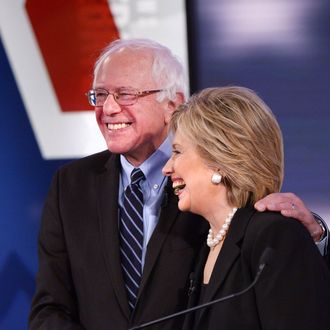
This week, not one but two members of the Clinton family have made headlines criticizing Bernie Sanders’s long-standing proposal for a single-payer health-care system that would make Medicare-style government insurance coverage available to all Americans. The Clinton running for president has intensified her charge that moving to a single-payer system would involve massive tax increases for the middle class and disrupt the slow progress toward universal coverage being made under the Affordable Care Act. Her daughter, Chelsea, has made her debut as a campaign-trail attack dog by claiming Sanders’s proposal would kill a variety of valuable existing health-care programs, while enabling Republican governors to screw up benefits the way they’ve done with the ACA’s intended Medicaid expansion.
Both of these lines of attack are more or less factual, but misleading. A single-payer system would mean significantly higher taxes, but would also mean the virtual abolition of private insurance premiums. You can argue that the latter won’t offset the former for this or that category of Americans, but you cannot fairly just ignore one side of the ledger. This argument, however, is near the crux of a broader disagreement between Clinton — who opposes middle-class tax increases categorically, and tends to favor narrower, means-tested social programs — and Sanders, who prefers Social Security/Medicare programs that include everybody and demand financial support from everybody.
Chelsea’s suggestion that Sanders is taking solid, dependable federal programs and trading them for one big program in which the states have a big role is equally credible on the surface but flawed when you look at the details. As Jonathan Cohn and Amanda Terkel note in an analysis of the dispute for the Huffington Post:
[B]ecause Sanders’ version of single-payer envisions separate state programs, Clinton and her allies have suggested that hostile state officials could thwart his plan. That’s also true. But what Clinton never adds is that Sanders’ scheme would also impose regulations, limiting state leeway over who to insure and what kind of coverage to supply.
In other words, Bernie Sanders, of all people, isn’t going to create some sort of block grant.
But even if the Clintonian criticisms of single-payer sometimes miss their target, others can and will be made. Above all, the breezy assumption of many single-payer advocates that the unquestioned popularity of Medicare makes its extension to the entire population a political no-brainer really misses how many seniors view the program.
We should have gotten a glimpse of the problem during the impressively successful GOP effort during and after the Affordable Care Act debate to convince seniors that Obamacare was being created at their expense. In part that was because of the half-truth that Medicare “cuts” were being made to help pay for Obamacare (funds used to make the Republican-favored Medicare Advantage option of subsidized private insurance more attractive were reduced, but not any actual benefits). But in part the resentment of Obamacare stemmed from the feeling that benefits seniors contributed toward (via payroll taxes) and worked toward for a lifetime were being given away to people who didn’t deserve them. Indeed, the concept of Medicare as an earned benefit rather than a “handout” is a big part of the reason the program (along with Social Security) is so popular to begin with. Diluting its character by making it truly universal might well sacrifice a great deal of its appeal.
Liberals like to chortle about dumb tea-partiers demanding that “the government keep its hands off my Medicare.” But even though it’s far from true that all Medicare benefits are “earned” (41 percent of the program’s costs are financed by general revenues, not payroll taxes or premiums), the idea of retirement benefits as a personal reward for all those years of work is deeply embedded in the psyches of millions of Americans, who may well disagree with Bernie Sanders that just living and breathing in the United States should “entitle” one to the kind and quality of health-care coverage Medicare provides. Yes, there are old folks who didn’t actually work their fingers to the bone and got Medicare anyway (along with those certified as disabled), but somehow these beneficiaries don’t arouse the same kind resentments as younger people jumping to the head of the line.
Single-payer proposals are often hit with misleading attacks that ignore the advantages that have made them so popular in much of the rest of the world. But let’s don’t imagine they are the political equivalent of a free lunch, either. The truth is that neither Sanders nor Clinton would enter the White House with a Congress where Democrats would have the power to do much of anything other than defend the health-care status quo. But someday that may cease to be true, and it’s helpful to sort these things out.
For now, though, Clinton and Sanders might do better to spend more time discussing the vast gulf that separates both of them from Republicans on health care.






























